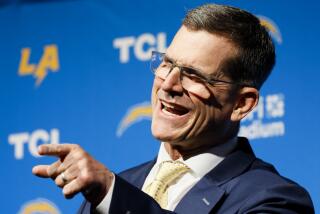ANALYSIS : New Drama Surrounds Raider Play Calling
- Share via
When quarterback Jeff Hostetler went jaw to jaw with his coach, Art Shell, last Sunday, eyebrows went up around the league.
It wasn’t the first time.
Hostetler raised quite a few eyebrows last year simply by coming to Los Angeles.
How in the world, people wondered, would a quarterback schooled in the art of a ball-control offense at the elbow of the master, Bill Parcells, function at the elbow of Al Davis, master of the bombs-away vertical game?
Among those wondering were the Raider hierarchy.
As late as last year’s regular-season opener, the Raiders were inquiring about the availability of Jeff George, then a disgruntled quarterback with the Indianapolis Colts.
Hostetler appeared to answer all the questions with a brilliant performance opening day as the Raiders beat the Minnesota Vikings, 24-7.
But he did it his way, completing a club-record 15 consecutive passes at one point, going with the short routes when the Viking secondary took away the vertical game.
Hostetler’s forte is keeping the chains moving, looking for the open man and picking up an acceptable three or four yards when the alternative is an unacceptable bomb into double coverage.
The knock on Hostetler’s predecessor, Jay Schroeder, was that he wouldn’t vary from the game plan even when prudence dictated it. His interceptions ran neck and neck with his touchdown passes.
Still, in 1993, Hostetler showed no aversion to the vertical game when it was there for the taking. He passed for 424 yards against the San Diego Chargers, a single-game Raider record, and hooked up with James Jett on enough long passes to enable Jett to lead the NFL in yards per catch last season with 23.4.
Hostetler’s leading receiver last year was wide receiver Tim Brown, who caught a career-high 80 passes. But the second-leading receiver was tight end Ethan Horton, who caught 43.
It was an admirable balancing act by Hostetler, who effectively mixed his preference for ball control with the Raiders’ love of the long game.
But 1994 has been different from the start.
In the first two games, Hostetler had trouble completing anything, long or short. The wounded ducks he was putting up made it appear as if he had a sore arm, although he vehemently denied that.
Whatever the problem, it was gone by the third game. But there were plenty of other problems to take its place: The Raiders dropped an alarming number of passes. The offensive line, despite the off-season addition of Kevin Gogan, was ineffective. And the running game was practically nonexistent, putting even more pressure on Hostetler.
And, finally, there was the play-calling.
That’s an inexact science on any team. But on the Raiders, it can sometimes be weird science.
Davis is unlike any other owner in the NFL, or any sport for that matter. He is out at practice every day. He talks to the players. He offers his opinions. And he meets afterward with Shell.
But Davis, despite rumors to the contrary over the years, does not phone down plays from his seat in the press box during games.
Next door to Davis in the coaching box sits Tom Walsh, the offensive coordinator, who does phone down the plays.
That job used to belong to Terry Robiskie, a close friend of Shell’s. But when the team struggled two years ago, Robiskie was replaced by Walsh, whose stock in the Raider organization has risen steadily.
The other member of the troika, Shell, has the deciding vote on the field. As the head coach, he has to maintain his authority, not always an easy task on this team.
And to make that task even more difficult, he has Hostetler and Brown on the field, two confident, opinionated players who don’t hesitate to complain about or tinker with the play calling when they think it necessary.
The criticism of the play calling has been heavy this season. There has been grumbling along the chain of command that Hostetler still doesn’t look downfield for the bomb often enough and that he depends on Brown too much.
There was even more grumbling when the Raiders gambled and failed on a crucial fourth down in a loss to the Chargers, going unsuccessfully with a run.
Questions about the play calling went public two weeks ago in New England when Brown threw up his hands in disgust after a play.
And then last week in Miami, Hostetler changed two running plays to passes, causing the furor on the sidelines.
So what now?
What happens the first time Hostetler doesn’t like something he sees in the Atlanta Falcon defense Sunday at the Coliseum? Or what happens when Brown comes back to the huddle and tells Hostetler a cornerback seems to have a tender hamstring and can be beat?
Shell says Hostetler will have leeway to adjust.
But when there are three official voices--Davis, Walsh and Shell--in the mix, and two unofficial voices--Hostetler and Brown--the question is, who gets the last word?
When the Raiders win, it doesn’t matter.
But when they don’t, watch out.
More to Read
Go beyond the scoreboard
Get the latest on L.A.'s teams in the daily Sports Report newsletter.
You may occasionally receive promotional content from the Los Angeles Times.










